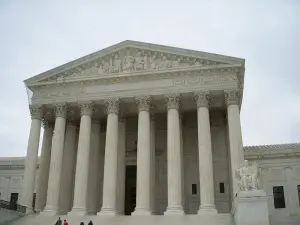 Children have a right to be counted as residents and to have their interests taken into consideration when decisions are being made by legislators. Yesterday, the Supreme Court upheld this notion when it unanimously ruled in favor of protecting the principle of one person, one vote in Evenwel v. Abbott.
Children have a right to be counted as residents and to have their interests taken into consideration when decisions are being made by legislators. Yesterday, the Supreme Court upheld this notion when it unanimously ruled in favor of protecting the principle of one person, one vote in Evenwel v. Abbott.
Appellants in Evenwel challenged Texas’s practice of using total population numbers from the census when drawing legislative districts. Total population numbers include children, new residents, immigrants and other populations that may not be eligible or registered to vote. Appellants argued that legislative districts should be drawn on the basis of those who are eligible to vote or registered to vote because they feel their votes are “diluted” in comparison to other districts that may have lower percentages of eligible or registered voters in their population. The Supreme Court ruled the method Texas used to draw legislative districts is constitutionally permissible and aligned with what the framers of the Constitution and the Fourteenth Amendment had envisioned.
A chilling effect would have taken hold on children’s rights had the Supreme Court ruled in favor of the appellants. Children are not eligible to vote but are still beneficiaries of a number of government programs including universal education, child welfare services, healthcare, environmental preservation, and a number of other services benefits that can make the difference in their healthy development and overall well-being. Lawmakers must make decisions that affect all the residents in their districts, including those who cannot vote, and are largely held accountable by their constituencies. Without children being counted as residents of their districts, any incentive to prioritize the rights of children in policymaking would diminish. Furthermore, since the census is only conducted once every 10 years, children and youth who would reach the voting age in the intervening years would face unequal representation.
The Children’s Defense Fund and a number of other organizations dedicated to protecting the interests of children submitted an amicus brief to the Supreme Court arguing that a ruling in favor of the appellants would be unfair to children for many of the reasons above. Justice Ginsburg, who wrote the majority opinion, seemed to recognize these points, noting that “nonvoters have an important stake in many policy debates- children, their parents, even their grandparents, for example, have a stake in a strong public-education system- and in receiving constituent services, such as help navigating public-benefits bureaucracies.”
We applaud the Supreme Court for resoundingly supporting the one person, one vote principle. This ruling upholds the concept that children matter and that their well-being must be considered by their elected representatives.
Supreme Court rules kids must be counted >> http://bit.ly/1SyRhwT v/ @First_Focus #InvestInKids #OnePersonOneVote
![]() Tweet this now.
Tweet this now.
Do you share our vision of making America a better place to be a child and raise a family? Then you should be a part of The Children’s Network, a movement led by individuals, non-profit organizations, and businesses committed to the health, education, and well-being of children in the United States.Become a part of the network and receive exclusive materials, updates, and opportunities to take action on behalf of our children.
First Focus is a bipartisan organization dedicating to making children and families the priority in federal policy and budget decisions. You can support our work by making a donation or joining The Children’s Network to receive updates and action alerts.